MercoPress. South Atlantic News Agency
Tag: Dilma Rousseff
-
Saturday, November 15th 2014 - 07:52 UTC
Something stinks in Petrobras: former director and leading contractors CEOs arrested on bribery charges

Brazilian police arrested a former Petrobras executive on Friday, sending the state-run oil company's shares and bonds down after a widening corruption scandal forced it to delay the release of its financial results.
-
Friday, November 14th 2014 - 06:38 UTC
Brazil's Rouseff re-election: lower expectations

By R. Viswanathan (*) - The reelection of President Dilma Rouseff means continuation of the slow growth of the Brazilian economy and a lower likelihood of much-needed, major political and economic reforms. India should lower its expectations on a global partnership with Brazil.
-
Wednesday, November 12th 2014 - 06:38 UTC
Rousseff tells Congress it will miss the fiscal target; resigning minister calls for a “shock of credibility”
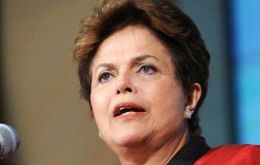
Brazilian President Dilma Rousseff on Tuesday asked Congress to allow the government to deduct all of its investments and tax exemptions from a key 2014 fiscal target, effectively lowering a goal that it will miss for the third straight year.
-
Tuesday, November 11th 2014 - 04:16 UTC
Unasur ready to help Venezuela organize a “major social pact” to overcome the current situation
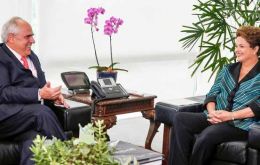
Venezuela needs a 'major social agreement' to adjust its economy and overcome the current and persistent political conflicts in the country, said Ernesto Samper, chairman of Unasur (Union of South American Nations) during a visit to Brasilia.
-
Saturday, November 8th 2014 - 09:37 UTC
Relief for Petrobras: Dilma allows increase in gasoline and diesel prices

Brazil raised domestic wholesale gasoline and diesel prices for the first time in more than 11 months effective Friday in a move to bolster the finances of the heavily indebted Petrobras oil and gas company after years of refining losses.
-
Friday, November 7th 2014 - 22:44 UTC
Despite Rousseff, extreme poverty grows for the first time in a decade

The number of Brazilians living in extreme poverty grew for the first time in a decade, according to government figures. The Institute of Economic Research reported that the number of people in households with incomes below the poverty threshold of 30 dollars rose from 10.1 to 10.5 million people, which means a 3.7% increase.
-
Tuesday, November 4th 2014 - 04:53 UTC
Bankers' names for Finance minister in Rousseff's next government
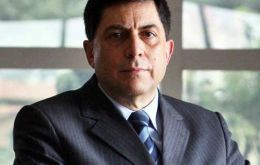
Brazilian banker Luiz Carlos Trabuco Cappi, president of Bradesco, turned down an invitation from president Dilma Rousseff to occupy the Finance ministry as of next January first. According to the Sao Paulo financial publication Valor, there was no insistence on the issue from political sources.
-
Monday, November 3rd 2014 - 11:14 UTC
President Dilma Rousseff's re-election exposes a divided Brazil

The re-election of President Dilma Rousseff's in Brazil has exposed a deeply divided country with an overwhelming support for the incumbent in the impoverished northeast, where millions receive benefits from huge welfare programs the ruling Workers Party (PT) has rolled out over the past decade.
-
Thursday, October 30th 2014 - 10:33 UTC
The challenges faced by Dilma Rousseff
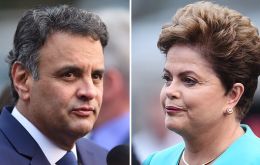
In a strong editorial the influential Folha de Sao Paulo argues that Brazil's reelected President Dilma Rousseff must reestablish confidence to the nation, which is divided regionally and socially, must implement a fluid dialogue with productive Brazil because the economy needs changes and new faces, and must rule for all the country, because victory was the result of millimetrical dispute in Sunday's runoff.
-
Tuesday, October 28th 2014 - 15:27 UTC
Brazilian economy remains in recession; Central bank survey indicates 0.27% growth this year
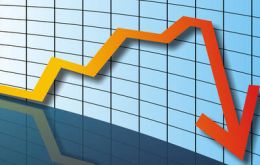
Private sector analysts are maintaining their 2014 growth forecast for Brazil's economy at 0.27%, the Central Bank said on Monday. GDP estimate was included in the Focus review, a weekly Central Bank survey of analysts from about 100 private financial institutions on the state of the national economy.
